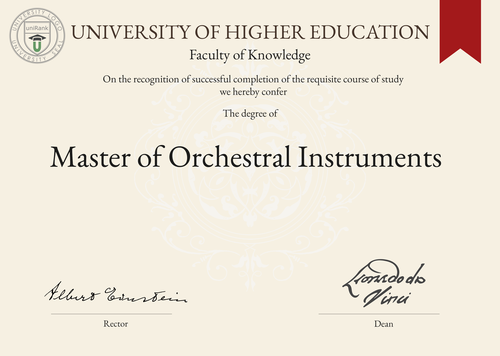
Master of Orchestral Instruments (M.O.I.)
Guide to Master of Orchestral Instruments Program/Course/Degree
Master of Orchestral Instruments (M.O.I.)

Program Name
Master of Orchestral InstrumentsProgram or Degree abbreviation
M.O.I.Duration range
The duration of the program typically ranges from 1 to 2 years.Tuition range
Tuition fees for the program can vary widely depending on the country and university, ranging from $10,000 to $50,000 per year.Overview
The Master of Orchestral Instruments program is designed for musicians who wish to specialize in playing orchestral instruments at an advanced level. It provides intensive training and performance opportunities to enhance technical skills, musicality and orchestral repertoire knowledge.Curriculum Overview by year
The curriculum is structured to provide a comprehensive education in orchestral performance. The coursework typically includes individual instrument lessons, ensemble rehearsals, orchestral repertoire classes, music theory, music history and performance practice. Year 1: - Advanced instrumental technique and repertoire - Orchestral excerpts and audition preparation - Music theory and analysis - Ensemble participation Year 2: - Advanced orchestral repertoire and performance - Chamber music and collaborative projects - Elective courses in musicology or pedagogy - Masterclasses and guest artist workshopsKey Components
- Intensive instrumental training - Orchestral repertoire knowledge - Ensemble participation - Music theory and analysis - Performance practice and interpretationCareer Prospects
Graduates of the Master of Orchestral Instruments program often pursue careers as professional orchestral musicians, chamber musicians, soloists, or music educators. They may find employment in symphony orchestras, opera companies, chamber ensembles, or teaching positions in universities and conservatories.Salary Expectations
Salary expectations for orchestral musicians can vary greatly depending on factors such as the size and prestige of the orchestra, location and experience. On average, orchestral musicians can earn between $30,000 to $150,000 per year. For a more accurate understanding of salary expectations, you can utilize the Job Sites Search Engine, from our sister site jobRank, which searches over 4,600 job sites worldwide. Make sure to specify not only the job title but also the country you are interested in.Conclusions:
It is important to note that the duration, tuition fees, curriculum, key components, career prospects and salary expectations of the Master of Orchestral Instruments program can vary significantly depending on the country or location where you choose to study, as well as the university you select. It is recommended to research and compare different programs and institutions to find the best fit for your goals and aspirations. To explore where this specific degree, Master of Orchestral Instruments, is offered anywhere in the world, visitors can utilize the uniRank World Universities Search Engine. This search engine provides a comprehensive database of universities worldwide, allowing you to find institutions that offer this program in various countries and locations.World Universities Search Engine
search for Master of Orchestral Instruments (M.O.I.) and add the Location (country, state etc.) or specific University you are interested in studying at.
Query examples:
- Master of Orchestral Instruments (M.O.I.) United States
- Master of Orchestral Instruments (M.O.I.) United Kingdom online
- Master of Orchestral Instruments (M.O.I.) Australia international students
- Master of Orchestral Instruments (M.O.I.) University of California
- Master of Orchestral Instruments (M.O.I.) University of London tuition fees
- Master of Orchestral Instruments (M.O.I.) University of Sydney scholarships
Share Program/Course
Interesting? Share this program/course/degree info with your friends now.